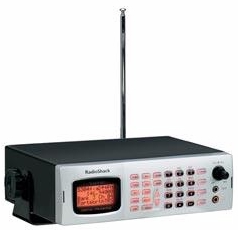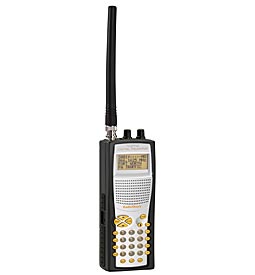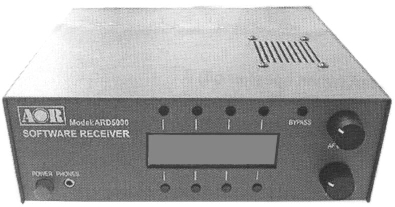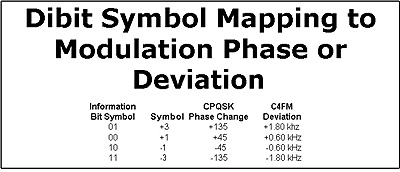 January 2005
January 2005
The PRO-2096 is listed in Radio Shack's on-line catalog as
part number 20-496 with a retail price of $499.99. You can
see the catalog listing by clicking
here.
September 2004
The PRO-2096, a base/mobile version of the handheld PRO-96,
has received type acceptance from the FCC. It is not yet
clear when it will be available for purchase. The FCC ID
is ADV2000496. You should be able to see the
GRE filing on the FCC website by clicking
here.
 January 2004
January 2004
Radio Shack has released a firmware upgrade to the PRO-96
scanner that allows it to properly track CQPSK (Compatible
Quadrature Phase Shift Keying) LSM (Linear Simulcast Modulation)
systems. The upgrade
instructions and
executable
can be found on the Radio Shack software download page
here.
Look for the files for part number 200-0526.
September 2003
Radio Shack has released their PRO-96 scanner, which is capable
of monitoring APCO 25 systems, including 9600-baud trunked networks.
The unit comes pre-loaded with many of the current digital systems,
making it easy-to-use right out of the box. List price is $499.99,
part number 20-526.
In addition to APCO-25, the scanner tracks Motorola I, II, and hybrid
systems as well as EDACS. It does not track LTR. It is not a
full-coverage receiver; it covers 25-54, 108-136.9875, 137-174,
216.0025-225, 406-512, 806-960 (less cellular), and
1240-1300 MHz.
August 2001
In
this
article in the Denver Post, Radio Shack spokesperson Jill Lain
is reported to have said that Radio Shack is also developing an add-on product
that will decode APCO-25 transmissions.
The latest rumor is that their scanner will be available around February 2003.
July 2005
The BCD396T handheld scanner is available for sale.
June 2004
An upgrade for the 296D is available on the
Uniden Product Support Page. The upgrade reduces "birdies"
in the 800-900 MHz range and improves the scanner's performance
on some APCO-25 systems.
An upgrade for the 796D is also available on the
Uniden Product Support Page. The upgrade addresses the same
issues as the 296D upgrade.
November 2003
Uniden introduces two new digital scanners, the handheld BC296D
and the base/mobile BC796D. These two units now include a digital
decoder card (BCi96) and can follow 9600-baud systems.
January 2003
Uniden has released two scanners capable of monitoring
APCO Project 25 systems.
The Bearcat BC250D
is a handheld unit with all of the features and capabilities of the
current production BC780XLT. The Bearcat BC785D is the base and/or
mobile version with a similar feature set. Each scanner has
1,100 channels in 10 banks and covers a frequency range of
25 MHz to 1300MHz (with the usual cellular telephone frequency gaps).
 By themselves, the scanners will monitor conventional and trunked
analog systems. The new feature on each of these scanners is a slot
that will accept an external electronic "card." In order to process
the P-25 transmissions, a BCi25D card must be inserted into the scanner.
By themselves, the scanners will monitor conventional and trunked
analog systems. The new feature on each of these scanners is a slot
that will accept an external electronic "card." In order to process
the P-25 transmissions, a BCi25D card must be inserted into the scanner.
October 2002
Various pre-release marketing materials seem to indicate
the BC250D and BC785D scanners will correctly track systems with
3600 baud control channels but will not be able to trunk track
9600 baud systems. This means for the following systems audio
will be available, but the scanner will not automatically follow
the conversation if it changes radio frequencies:
- State of Arizona
- State of Colorado
- State of Michigan
- State of Minnesota
- City of Minneapolis, Minnesota
- Hennepin County, Minnesota
- City of Austin, Texas
- Henrico County, Virginia
September 2002
Uniden's two new APCO-25 capable scanners have received FCC type
certification in September 2002, meaning it is legal to offer them
for sale in the United States.
January 2002
At the Consumer Electronics Show in January 2002, Uniden announced
the development of two APCO-25-capable scanners, the handheld
BC250D and the base/mobile BC785D.
May 2001
Uniden is expecting to have an APCO-25 capable scanner available
in mid to late 2002, according to an article in
Mobile Radio Technology. Click
here
to see that article.
 June 2004
June 2004
The ARD25 is released for sale.
May 2004
AOR announces their ARD25 "Data Receiver," an add-on unit that
decodes non-trunked APCO-25 transmissions from a 10.7 MHz IF
output.
I wrote a review of this device that appeared in the September 2004
issue of Monitoring Times magazine.
You can read the review
here.
May 2002
At the 2002 HamVention in Dayton, AOR displayed a prototype of
their ARD5000 APCO-25 decoder. It is a separate box that takes
a 10.7 MHz IF feed from a receiver and produces audio and a
digital data stream.
It is expected to in production by the end of 2002, with a target
market of government agencies and the news media.
|
|  APCO Project 25 is a set of industry standards for digital mobile
radio designed primarily for public safety agencies.
APCO Project 25 is a set of industry standards for digital mobile
radio designed primarily for public safety agencies.
 January 2005
January 2005
 January 2004
January 2004
 By themselves, the scanners will monitor conventional and trunked
analog systems. The new feature on each of these scanners is a slot
that will accept an external electronic "card." In order to process
the P-25 transmissions, a BCi25D card must be inserted into the scanner.
By themselves, the scanners will monitor conventional and trunked
analog systems. The new feature on each of these scanners is a slot
that will accept an external electronic "card." In order to process
the P-25 transmissions, a BCi25D card must be inserted into the scanner.
 June 2004
June 2004
 The Common Air Interface (CAI) provides a digital channel in
12.5 kHz of bandwidth.
The Common Air Interface (CAI) provides a digital channel in
12.5 kHz of bandwidth.